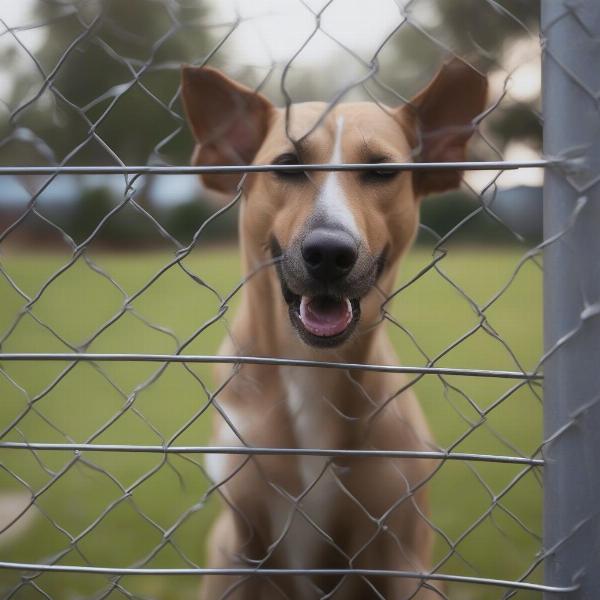Dogs licking metal might seem strange, but it’s a surprisingly common behavior. Understanding why your dog engages in this behavior is key to ensuring their well-being. From nutritional deficiencies to behavioral reasons, this article will explore the potential causes behind your dog’s metal-licking habit and offer practical advice on how to address it.
Potential Reasons Behind Your Dog’s Metal-Licking Habit
There are several reasons why a dog might develop a penchant for licking metal. One possibility is a nutritional deficiency, such as a lack of iron or minerals in their diet. Dogs might instinctively seek out metal surfaces as a way to supplement these missing nutrients. Another common cause is pica, a compulsive disorder characterized by the ingestion of non-food items. Pica can stem from various underlying issues, including anxiety, stress, or boredom. Sometimes, the simple act of licking provides sensory stimulation, especially if the metal is cold or has an interesting texture. This is particularly true for puppies who are exploring their world through their mouths. Lastly, medical conditions like nausea or cognitive dysfunction can also contribute to this behavior.
Nutritional Deficiencies and Pica
If your dog’s diet is lacking essential minerals, they might try to compensate by licking metal. A blood test can help your veterinarian determine if there are any deficiencies. If a deficiency is diagnosed, dietary adjustments or supplements can often rectify the issue. Pica, as mentioned, is a more complex issue. Identifying the underlying cause, whether it’s anxiety, boredom, or a medical condition, is crucial for effective treatment. This often involves a combination of behavioral modification, environmental enrichment, and sometimes medication.
 Dog Licking Metal Fence
Dog Licking Metal Fence
Medical Conditions and Sensory Stimulation
Certain medical conditions, like nausea or cognitive dysfunction, can also manifest as metal licking. If your dog is exhibiting other symptoms like vomiting, lethargy, or changes in behavior, consult your veterinarian immediately. Sometimes, the reason is simply sensory. The cool, smooth surface of metal might provide a pleasurable sensation for your dog, especially during hot weather. Providing alternative sensory experiences, such as chew toys or frozen treats, can often redirect this behavior.
When to Consult a Vet
If your dog’s metal licking is frequent, excessive, or accompanied by other changes in behavior or health, it’s important to seek professional advice. Your veterinarian can rule out any underlying medical conditions and help you determine the best course of action to address this behavior.
Conclusion
Dog licks metal for a variety of reasons, ranging from simple sensory stimulation to more complex medical or behavioral issues. Understanding the potential causes behind this behavior is essential for ensuring your dog’s health and well-being. If you’re concerned about your dog licking metal, don’t hesitate to consult your veterinarian. Addressing the root cause, whether it’s a nutritional deficiency, pica, or a medical condition, will help your furry friend live a happier and healthier life.
FAQ
- Is it dangerous for my dog to lick metal? While occasional licking might not be harmful, excessive metal licking can lead to dental problems, ingestion of toxins, or worsen underlying medical conditions.
- What should I do if I catch my dog licking metal? Redirect their attention with a toy or treat, and try to identify any potential triggers for the behavior.
- Can a change in diet stop my dog from licking metal? If the licking is due to a nutritional deficiency, a change in diet or supplements might help.
- Could anxiety be causing my dog to lick metal? Yes, anxiety or stress can contribute to pica and metal licking.
- What tests might my vet recommend? Blood tests can help identify nutritional deficiencies, while other diagnostic tests might be necessary to rule out other medical conditions.
- Are there any home remedies for dog licking metal? Addressing underlying issues like boredom or anxiety with enrichment activities and training can be helpful, but it’s always best to consult with a vet.
- What are some safe alternatives for my dog to lick? Frozen treats, chew toys, and lick mats can provide safe and enjoyable sensory stimulation.
Related Articles on ILM Dog
About ILM Dog
ILM Dog (https://ilmdog.com) is your trusted resource for all things dog-related. We offer expert advice on dog breeds, health, training, nutrition, grooming, and much more. From choosing the right breed to providing the best possible care, ILM Dog is dedicated to helping you navigate the world of dog ownership. Contact us today for expert advice: Email: [email protected], Phone: +44 20-3965-8624.